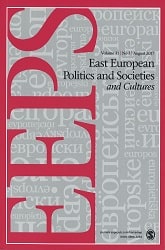The Politics of Minimal “Consensus”. Interethnic Opposition Coalitions in Post-Communist Romania (1990-96) and Slovakia (1990-98)
The Politics of Minimal “Consensus”. Interethnic Opposition Coalitions in Post-Communist Romania (1990-96) and Slovakia (1990-98)
Author(s): Mihaela MihăilescuSubject(s): Political history, Government/Political systems, Transformation Period (1990 - 2010), Post-Communist Transformation, Inter-Ethnic Relations, Ethnic Minorities Studies
Published by: SAGE Publications Ltd
Keywords: Eastern Europe; interethnic conflict; ethnic minorities; opposition parties; interethnic coalitions;
Summary/Abstract: This article argues that the inclusion of ethnic Hungarian parties within the Slovak and Romanian democratic oppositions during the early years of democratic transition was a critical element for the peaceful management of interethnic relations in these two multiethnic new democracies. Contrary to what the existing literature suggests, violent conflict was averted despite the absence of institutions specially designed to manage interethnic relations, the exclusion of ethnic minorities from government, and quasi-majoritarian political environments. In the two studied cases, interethnic opposition coalitions resulted from the adoption of basic democratic political institutions, which constrained actors across the ethnic divide to cooperate based on a minimal consensus agenda. More broadly, this article questions the claim that multiethnic countries are unlikely candidates for peaceful democratization, and suggests that as long as participation in democratic processes, either in government or in opposition, is possible for ethnic minorities, violent conflict can be averted.
Journal: East European Politics and Societies
- Issue Year: 22/2008
- Issue No: 03
- Page Range: 553-594
- Page Count: 42
- Language: English
- Content File-PDF

